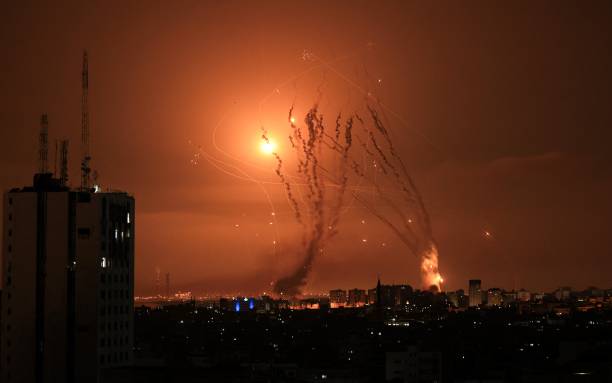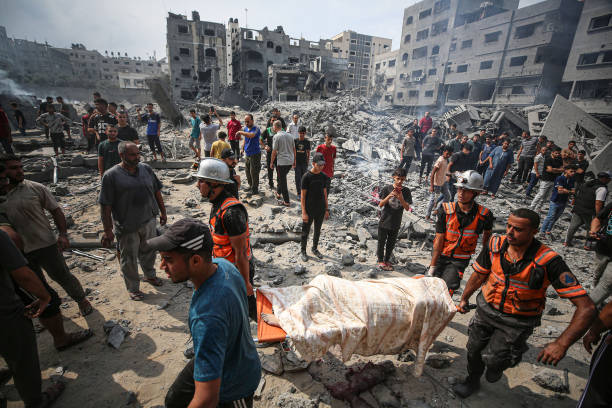The conflict between Israel and Palestine is a complex and long-standing one, with roots dating back to the late 19th century. The conflict is centered on the land that is now Israel and the Palestinian territories, which are claimed by both sides.

The modern conflict between Israel and Palestine began in the late 19th century, when the Zionist movement began to promote the establishment of a Jewish homeland in Palestine. At the time, Palestine was part of the Ottoman Empire, and the majority of its population was Arab.
In 1917, during World War I, the British government issued the Balfour Declaration, which expressed support for the establishment of a Jewish homeland in Palestine. After the war, the Ottoman Empire was dissolved and Palestine became a British Mandate.

During the British Mandate, the Jewish population in Palestine grew significantly. This led to increased tensions between Jews and Arabs, and culminated in the 1947-1948 Arab-Israeli War.
In 1948, the United Nations voted to partition Palestine into two states, one Jewish and one Arab. However, the Arab states rejected the partition plan and invaded Israel. The war ended with Israel in control of most of the territory that had been allocated to it by the UN, as well as some additional territory.
The war resulted in the displacement of hundreds of thousands of Palestinians, who became refugees in neighboring Arab countries. This event, known as the Nakba (catastrophe), is still commemorated by Palestinians today.
In 1949, Israel was admitted to the United Nations. However, the Arab states refused to recognize Israel’s legitimacy, and the conflict between the two sides continued.
In 1967, Israel fought the Six-Day War against Egypt, Syria, and Jordan. The war ended with Israel in control of the Gaza Strip, the West Bank, the Golan Heights, and East Jerusalem.
The Six-Day War marked a turning point in the conflict. Since then, Israel has occupied the Palestinian territories, and the two sides have been unable to reach a lasting peace agreement.

The occupation has had a devastating impact on the Palestinian people. Palestinians living in the occupied territories are subject to Israeli military law, and they face restrictions on their movement, employment, and access to education and healthcare.
The occupation has also led to the growth of the Palestinian resistance movement, which has carried out attacks against Israeli civilians and soldiers.
In 1987, the First Intifada, or uprising, began in the occupied territories. The Intifada lasted for six years and ended with the signing of the Oslo Accords in 1993.
The Oslo Accords were an attempt to resolve the conflict through a two-state solution, with Israel and Palestine living side-by-side in peace. However, the Oslo Accords failed to achieve their goals, and the conflict continued.
In 2000, the Second Intifada began. The Intifada lasted for four years and was characterized by violence on both sides.
In 2005, Israel withdrew from the Gaza Strip, but it continued to maintain a blockade of the territory. The blockade has had a devastating impact on the Gaza economy, and it has left the Gazan people struggling to meet their basic needs.
In 2007, Hamas took control of the Gaza Strip. Hamas is a Palestinian militant group that is opposed to the existence of Israel.
Since 2007, there have been four major wars between Israel and Hamas. The most recent war took place in May 2021.
The conflict between Israel and Palestine is one of the most intractable conflicts in the world. Both sides have legitimate concerns, and it will be difficult to find a solution that satisfies everyone. However, it is important to remember that the people of Israel and Palestine deserve to live in peace and security.
Here are some of the key causes of the Israel-Palestine conflict:
- Historical claims to the land: Both Israelis and Palestinians claim the land that is now Israel and the Palestinian territories as their homeland. These claims are based on religious, historical, and cultural factors.
- The issue of refugees: The 1948 Arab-Israeli War resulted in the displacement of hundreds of thousands of Palestinians. These Palestinians and their descendants remain refugees in neighboring Arab countries. The issue of refugees is one of the most contentious issues in the conflict.
- The Israeli occupation: Israel has occupied the Palestinian territories since the 1967 Six-Day War. The occupation has had a devastating impact on the Palestinian people, and it is one of the main obstacles to peace.
- The Palestinian resistance movement: The Palestinian resistance movement has carried out attacks against Israeli civilians and soldiers in an effort to end the occupation and achieve Palestinian independence. These attacks have led to Israeli reprisals, and they have made it difficult to achieve peace.